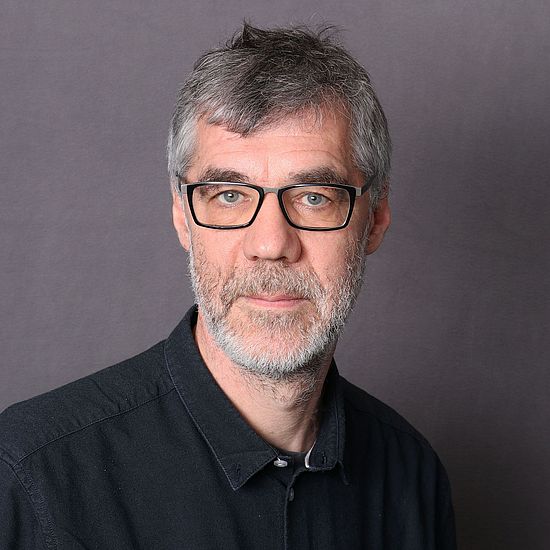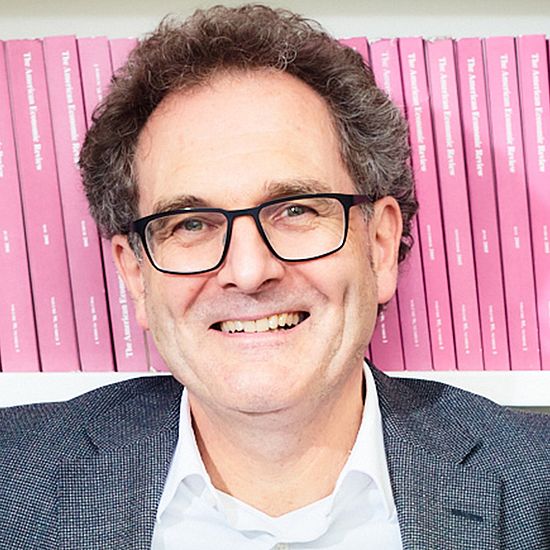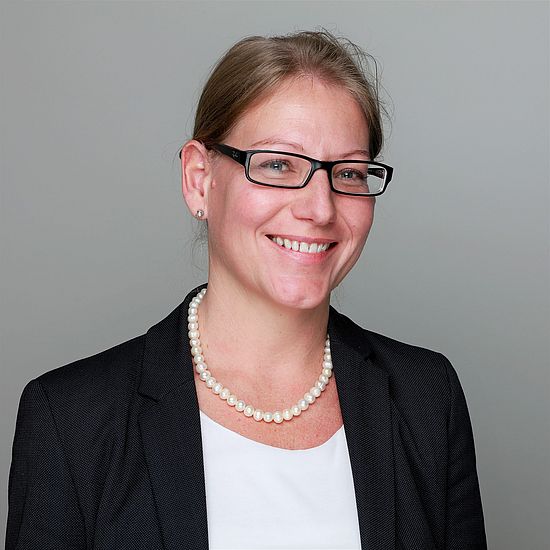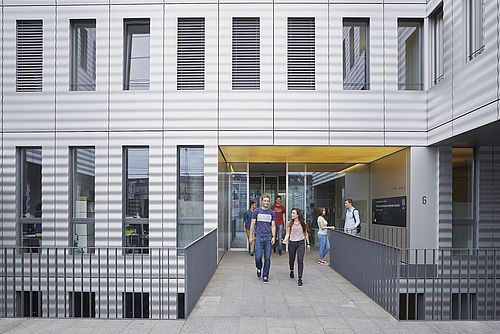
MajorInternational Business, Trade and the Environment
Im Zentrum des Majors stehen zum einen die Kernthemen, mit denen sich Organisationen in einem internationalen kompetitiven Umfeld befassen müssen. Zum anderen geht es um die Analyse der Reaktion von Unternehmen und Staaten auf die veränderten Rahmenbedingungen, die aus der zunehmenden Öffnung von Güter‐, Dienstleistungs und Faktormärkten («Globalisierung») sowie der wachsenden Wahrnehmung von Umweltbelastungen resultieren. Dabei werden auch die Auswirkungen auf die langfristige Entwicklung einer Volkswirtschaft analysiert. Weiterhin erwerben die Studierenden fortgeschrittene methodische Kenntnisse in den Bereichen Internationale Handelstheorie und Umweltökonomie und lernen, diese auf aktuelle Fragestellungen in international tätigen Firmen und in Behörden anzuwenden.
| Modul | Kreditpunkte |
|---|---|
| Fundamentals in Business and Economics | 12 |
| Core Courses in International Business, Trade and the Environment | 18 |
Research Design in International Business, Trade and the Environment | 6 |
| Specific Electives in IInternational Business, Trade and the Environment | 12 |
| General Electives | 0 bis 24* |
| Masterarbeit in International Business, Trade and the Environment | 18 or 30 |
| Total | 90 |
* Wenn Sie in anderen Modulen des Studiengangs mehr als die Mindest-KP-Zahl erworben, so reduziert sich entsprechend die Mindest-Kreditpunktzahl, im Extremfall auf 0 KP.
Studierende mit einem Hochschulabschluss, der quantitativ und qualitativ dem Bachelor of Arts in Business and Economics der Universität Basel entspricht, werden ohne Auflagen zum Masterstudium zugelassen. Andere Hochschulabschlüsse werden auf Äquivalenz überprüft und sind gegebenenfalls mit Auflagen zugelassen.
Interessenten mit einem Bachelorabschluss in Betriebsökonomie der Fachhochschule Nordwestschweiz finden ausführliche Informationen zur Zulassung und dem optimalen Studienverlauf in diesem Merkblatt.
Die detaillierten Zulassungsbedingungen sind im Studienplan geregelt. Bei Fragen zu möglichen Auflagen können Sie sich an das Studiendekanat der Wirtschaftswissenschaftlichen Fakultät wenden. Ohne eine vorliegende Anmeldung zum Studium kann jedoch nur eine rechtsunverbindliche Auskunft erfolgen.
Ihre Bewerbung richten Sie bitte an das zentrale Studiensekretariat. Von dort erhalten Sie auch den rechtsverbindlichen Zulassungsentscheid.
Modulverantwortlicher:

Prof. Dr. Frank Krysiak
Frank Krysiak is Professor for Environmental Economics. He holds a PhD in Economics from the Technical University of Berlin and has joined the Faculty of Business and Economics in 2006. From 2014-2020, he has been head of one of the SCCER CREST. His research focusses on the long-term effects of energy and climate policy (e.g., the effects on green technological change), on the design of energy markets, and on the economics of sustainability. His work has been published in major journals, such as, the European Economic Review, the Journal of Environmental Economics and Management, or the Journal of Public Economics. In addition to his research, he represents the Faculty of Business and Economics in the Master of Sustainable Development and is a member of the Federal Energy Research Commission (CORE).
Weitere Dozierende

Prof. Dr. Georg Nöldeke
Georg Nöldeke has been Professor of Microeconomic Theory at the University of Basel since 2006. His areas of expertise are game theory, contract theory, and information economics. He has taught related courses not only at the University of Basel, but also at other renowned institutions, including Princeton University, Columbia University, Tel Aviv University, and Yale-NUS College in Singapore. His recent research on collective action problems, matching markets, and search has been published in journals such as Econometrica, Games and Economic Behavior, Journal of Economic Theory, Journal of Theoretical Biology, and The American Naturalist.

Prof. Dr. Rolf Weder

Prof. Dr. Hannes Weigt
Hannes Weigt is Professor for Energy Economics at the University of Basel. He is head of the Research Center for Sustainable Energy and Water Management (FoNEW) and member of the University Basel Research Network Sustainable Future, and has been Work Package leader within SCCER CREST on “Energy Policy, Markets and Regulation.” His research focus is on energy markets and policy design, with a particular focus on modeling the future electricity system. He published in economic field journals like The Energy Journal, Energy Economics, and Network and Spatial Economics, as well as interdisciplinary journals like Energy Research and Social Science, Sustainability, PLoS ONE, and Water Resources Research.

Prof. Dr. Conny Wunsch
Conny Wunsch is Professor of Labor Economics at the University of Basel and head of the Graduate School of Business and Economics. Her research focuses on labor economics and econometric methods. She is co-editor of Labour Economics and the Swiss Journal of Economics and Statistics, and a member of the scientific advisory boards of the KOF Swiss Economic Institute, the Institute for Employment Research (IAB), and the RWI Essen. She is also a research fellow of the Centre for Economic Policy Research (CEPR), CESifo, DIW, and IZA. She published in Experimental Economics, the Industrial and Labor Relations Review, the Journal of Econometrics, the Journal of the European Economic Association, the Journal of Health Economics, the Journal of Labor Economics, and the Review of Economics and Statistics.
Kontakt

Studiendekanat
Universität Basel Wirtschaftswissenschaftliche Fakultät
Peter Merian-Weg 6, Büro EG.40
CH-4002 Basel
Tel: +41 61 207 33 01
Webseite Studiendekanat
Quick Links
Social Media
